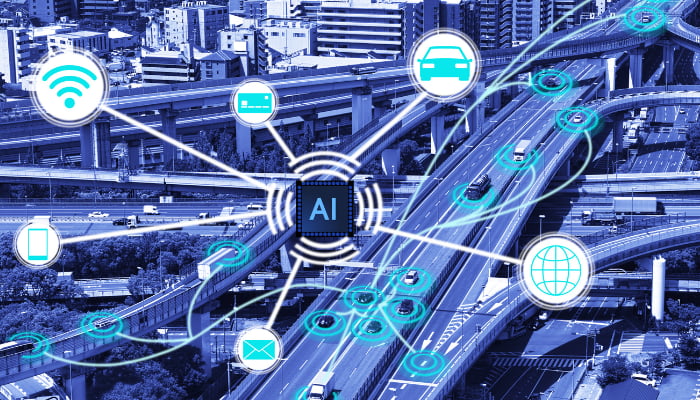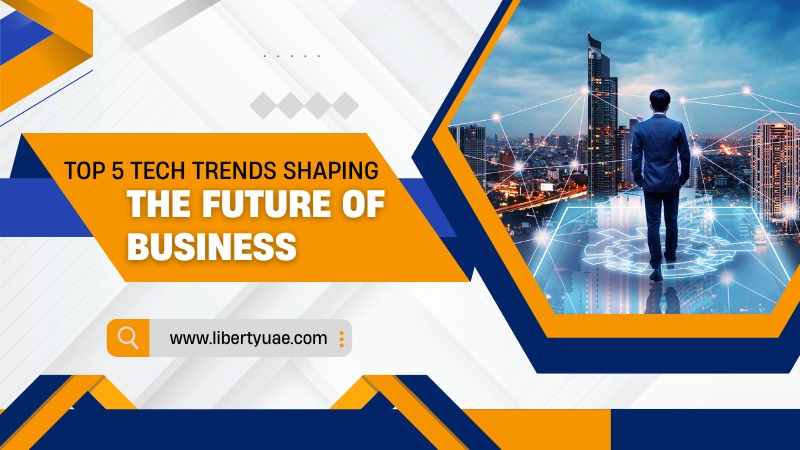There have been substantial changes in the way things are done since the Fourth Industrial Revolution people, organizations, and communities interact. With the help of new technology, customers and companies can now establish meaningful connections that were previously unimaginable.
This exchange of information has opened up new opportunities for businesses to integrate themselves into people’s daily lives and establish a strong rapport with their clients. With the potential for such deep connections, success in the market is no longer just possible, but highly likely.
Here are the Top 5 Tech Trends:
1. Artificial Intelligence

Artificial intelligence (AI) is transforming the manner businesses work and helping them unlock tremendous value. With the help of AI-powered chatbots, virtual aids, and robotic procedure automation systems, companies can enhance customer service, streamline operations, and decrease expenses.
AI technology can be classified into two main categories: machine learning and profound learning. Machine learning employs algorithms to learn from past data and use those patterns to make forecasts. On the other hand, deep learning employs neural networks to recognize intricate patterns through numerous iterations. This permits profound learning systems to learn autonomously without human programming.
2. Internet Of Things

The Internet of Things (IoT) is a network of interconnected smart appliances that can transmit with each other through the Internet, enabling the exchange of large amounts of data automatically. This creates an unprecedented opportunity for businesses to optimize their operations by utilizing the wealth of information available.
By automating processes and optimizing operations, IoT technology allows enterprises to make more intelligent determinations. With sensors available for nearly every task, businesses can monitor inventory levels, track warehouse temperatures and humidity, and gain complete oversight of their operations. This results in better planning when implementing new programs or policies. Additionally, the IoT leads to enhanced productivity by freeing up humans from repetitious chores that smart gadgets can automate.
3. Autonomous Things

Autonomous things refer to an array of technologies that can revolutionize our world, including automated vehicles, drones, and robots. These cutting-edge technologies are already transforming businesses of all sizes and will continue to do so in the future.
Many different tasks have already been accomplished by autonomous robots, from delivering mail and packages to exploring the depths of the ocean floor. Self-driving vehicles are also becoming increasingly common, with the possibility to change transportation as we understand it.
However, there are many other possibilities to integrate autonomous technology into your company. For instance, implementing a drone program could enable you to deliver products to customers located in remote areas, or it could help you expand your services to areas that were previously challenging and expensive to access.
4. Blockchain Technology

The blockchain technology that underpins Bitcoin is creating a stir in the business realm as a secure method for storing data and transferring value online. As a decentralized system, there is no central authority governing access to information or transactions, allowing all users to have access to all data on the network simultaneously. In situations where numerous parties need to have access to real-time updates on orders, shipments, inventories, and payments, blockchain technology is ideal for managing supply chains.
Moreover, blockchain delivers a group of clarity that facilitates faith between all players in an ecosystem, as they all have entry to the same details at all times.
5. Cloud Computing

Cloud computing has transformed the way businesses store and get their data. Instead of using physical servers, companies can now store their data remotely on servers that can be accessed through the Internet.
This technology offers substantial expense protection for businesses, as they are no longer required to invest in expensive IT infrastructure. Moreover, cloud computing provides greater flexibility as users can get their files from elsewhere with an internet connection, making it easier for them to work remotely or on the go.
Small businesses can also benefit from cloud computing as it removes the requirement for them to purchase and keep costly hardware and software. This makes it more comfortable for them to embrace new technologies with no incurring significant upfront costs.
Additionally, cloud platforms provide businesses with the ability to quickly scale up their resources during busy periods such as back-to-school sales or holiday shopping seasons. This means they can meet customer demands without investing laboriously in extra hardware or software.
Conclusion
The aforementioned trends are just a glimpse of the many technological advancements that are currently transforming the business world. It’s worth noting that these trends are not independent and leveraging multiple technologies can provide great advantages for companies.
The use of technology trends allows businesses to streamline their operations, increase efficiency, and propel growth.




.png)


